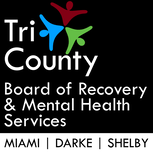Mental health crisis services are available, within the limits imposed on admission to public places such as jails and hospitals. Persons experiencing a mental health crisis, generally defined as severe, debilitating symptoms of anxiety or depression, loss of reality, or suicidal thoughts, should call the 24\7 Tri-County Crisis Hotline at 800-351-7347.
Persons who may be experiencing a crisis but can't don't want to talk may use the national Crisis Text Line by texting "4hope" to 741741.
Persons concerned about suicidal thoughts may also call the National Suicide Prevention Lifeline at 800-273-TALK (8255). Talking about suicide is often the best way to prevent a suicide attempt.
Persons who are anxious but not in crisis may call the HOPE Line operated by SaveHaven Inc. The warm line - as opposed to a hotline for emergencies - allows people to talk about their concerns with a trained operator. The HOPE Line can be reached at 937-451-3232 or toll free at 855-276-HOPE (4673). Hours are Monday through Friday 4-11PM, and Saturday and Sunday 4-8PM.
Recovery and Wellness Centers of Midwest Ohio in Tipp City and Greenville asks that new or existing clients not come to the facility unless requested to do so, but rather call the central scheduling number, 937-423-6356, and to check the website, recoveryandwellnessohio.org for updates and information.
RWC Executive Director Cynthia Wion said their transition to alternative methods of meeting clients has gone relatively smoothly given the suddenness of the pandemic restrictions. "We can start clients with a phone call, email them the consent forms and other documents, and get them started without having to meet face to face." She added that many of RWC's professional staff are able to work from home.
Miami County Recovery Council in Troy requests that new and existing clients call the main number, 937-335-4543 ext 155, before coming to the office. More information and updates can be found at mcrcinc.org.
MCRC Executive Director Thom Grim said, "We are still here for people. We are being careful for staff who are on the front lines, but we are still providing services for those who need them." Grim said MCRC is mostly providing telephone and telehealth services when possible for the safety of clients and staff. He added that group therapy, which has been temporarily suspended due to restrictions on the size of gatherings, will soon resume through an online format.
At Family Resource Centers of Northwest Ohio's Sidney office, clinical services via telephone and video will be available soon, according to a notice posted to the organization's website by CEO John Bindas. Persons seeking services should call first at the Sidney office number, 937-710-4616, or FRC's hotline 888-936-7116. Additional information can be found at frcohio.com.
At Safehaven's three locations in Piqua, Greenville and Sidney, staff is available by phone and online, but on-site activities have been curtailed. Executive Director Doug Metcalfe, in statement circulated Wednesday, stated that while SafeHaven is unable to open to members, they are adapting services to provide meals to current members along with activities and online group meetings. Online support sessions will take place at 11:30AM, 1:00PM and 2:30PM, and will be site-specific.
SafeHaven staff is making daily outreach and wellness calls to members, and welcomes incoming calls for peer support in addition to the HOPE Line services. Payeeship services continue, except that appointments will be by phone only. For a complete rundown of services available to SafeHaven members, go to safehaveninc.com.
The Tri-County Board of Recovery and Mental Health Services has been closely monitoring updates from the Governor's office and the Ohio Department of Mental Health and Addiction Services to help provide guidance to local providers of services.
For example, existing Medicaid rules do not allow agencies to bill for counseling services by telephone. However, once the scope of the pandemic became apparent, the Governor's office and OhioMHAS expressed a strong inclination toward services by phone. Tri-County Board Executive Director Terri Becker communicated to the provider agencies that, pending changes in Medicaid billing rules, the Board would use local mental health levy dollars within existing contracts to enable agencies to start providing services by phone as soon as they are ready to do so.
Tri-County Board staff are transitioning to work from home as much as possible. The Board office remains open for business but no members of the public are permitted into the office, in compliance with a directive from Miami County officials. Persons wishing to contact the Board office are requested to call 937-335-7727 and press 7 for a staff directory. More resources and information can be found at the Board's website www.tcbmds.org.
 RSS Feed
RSS Feed
